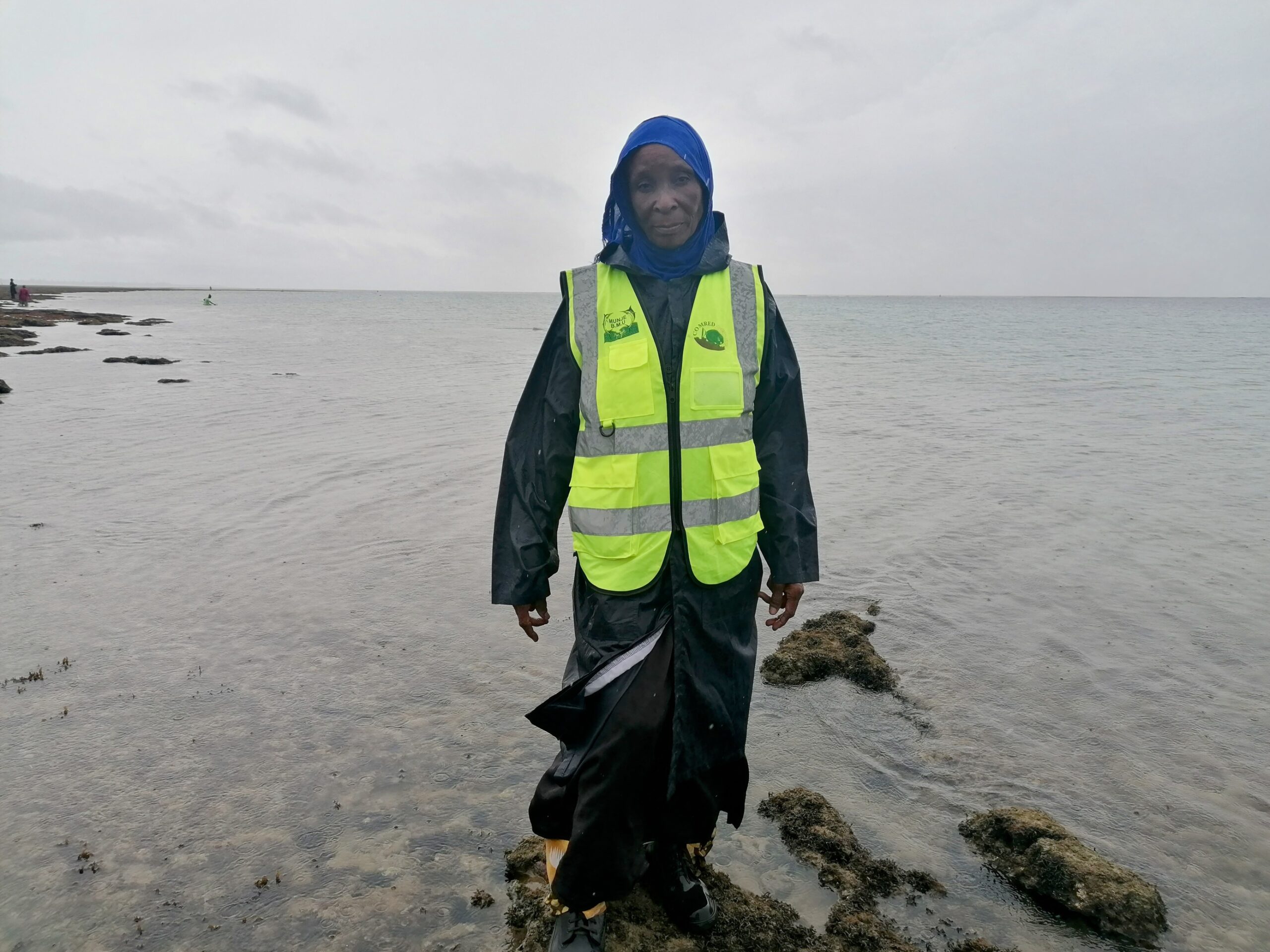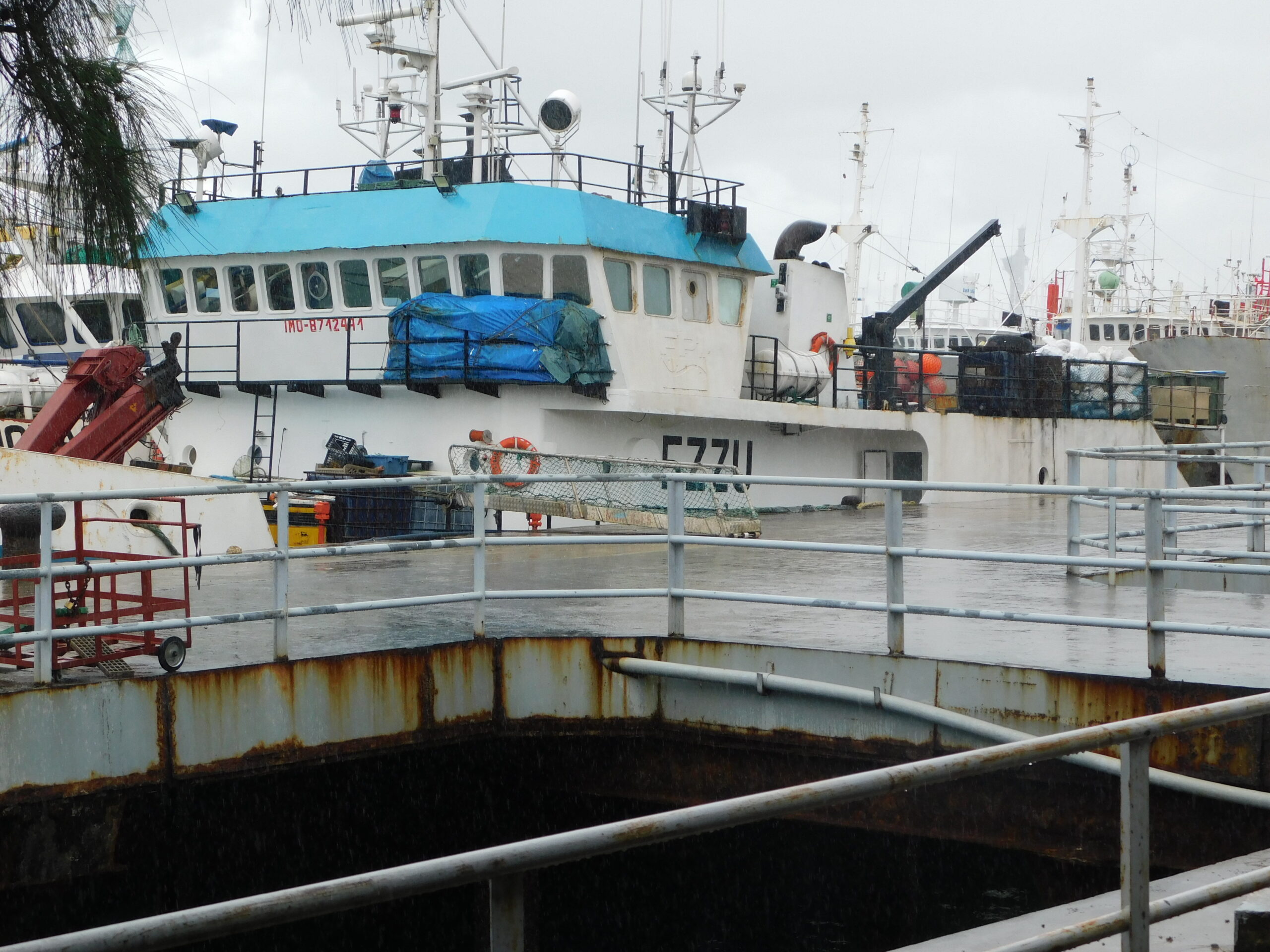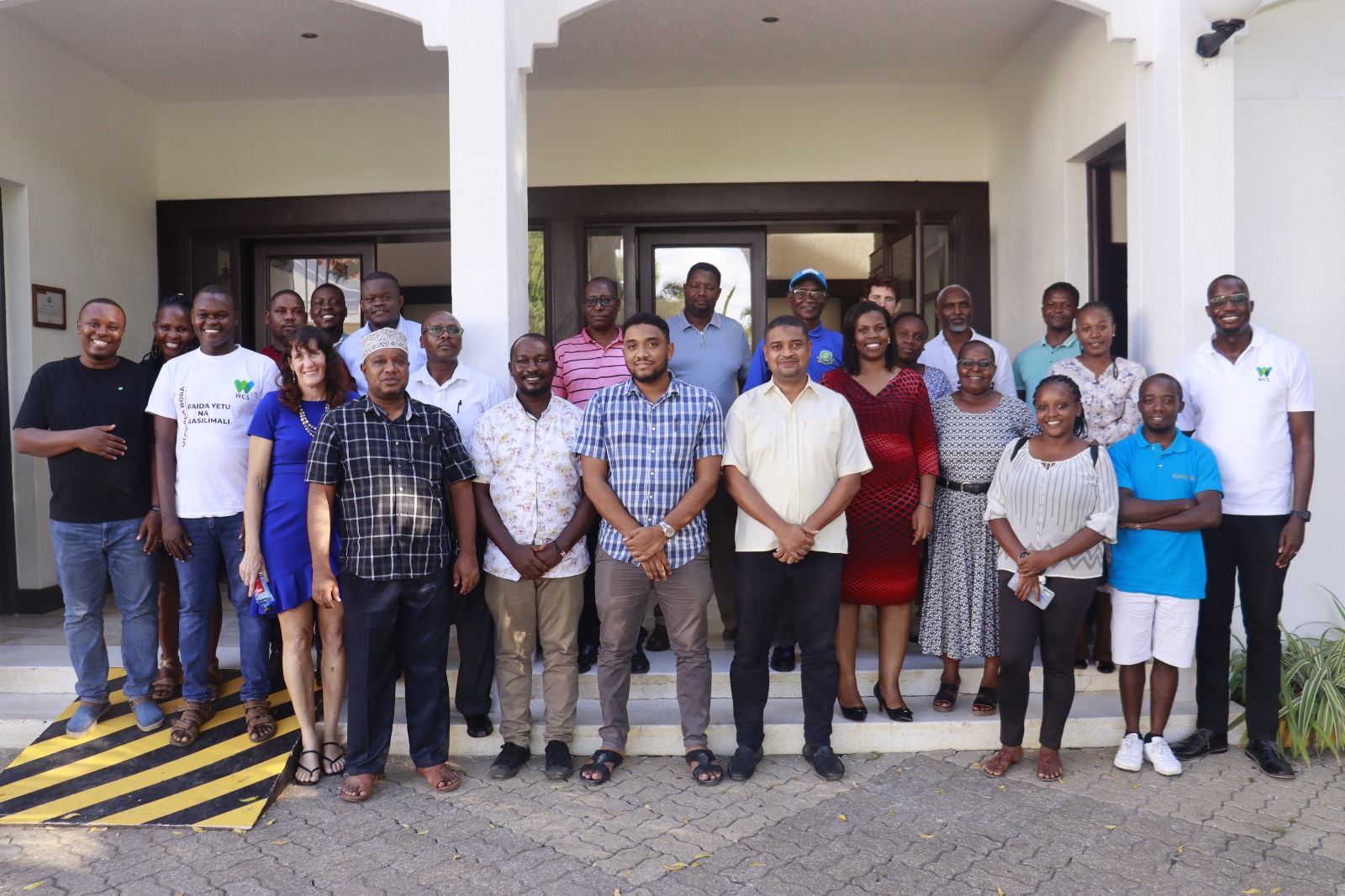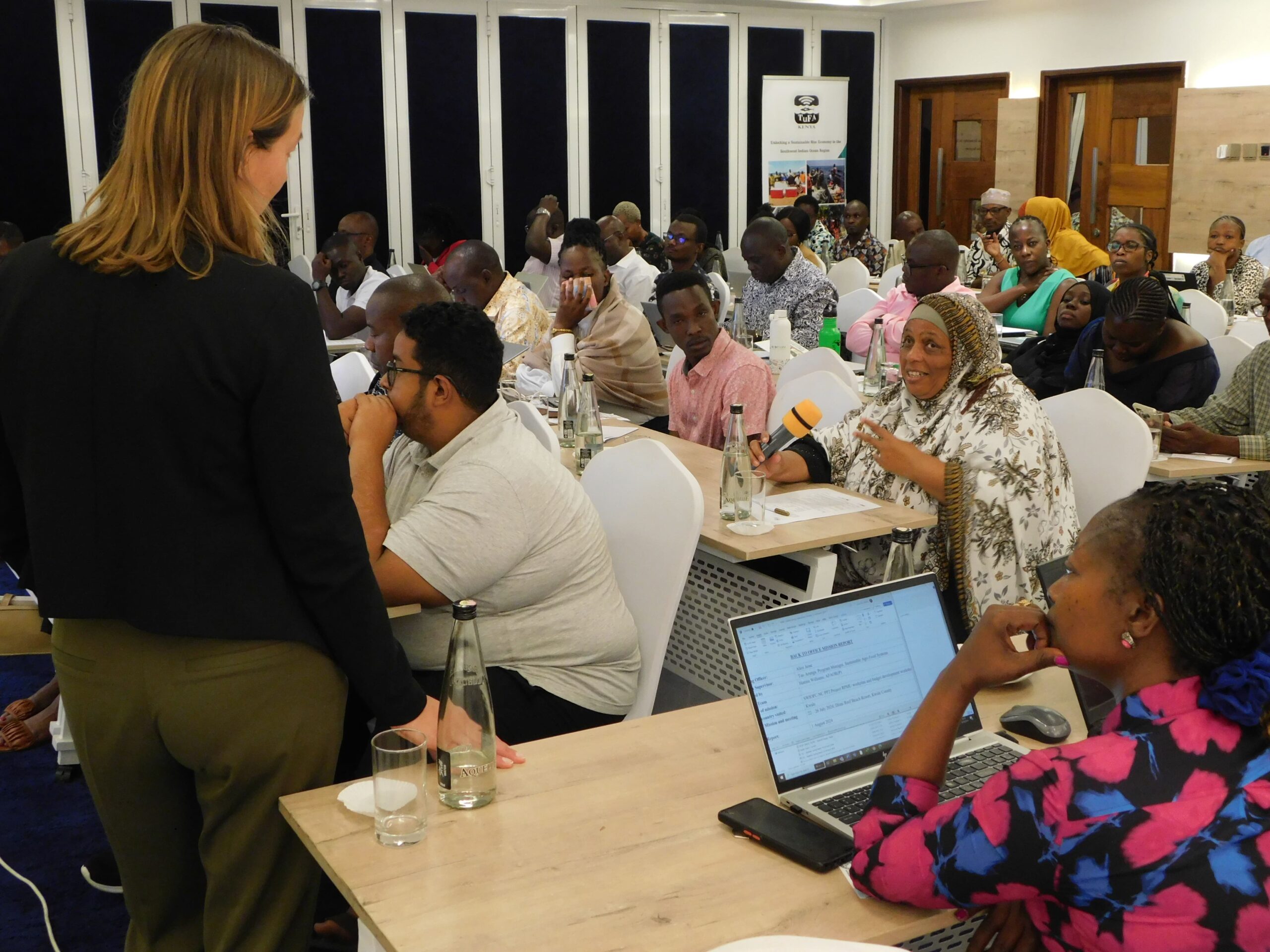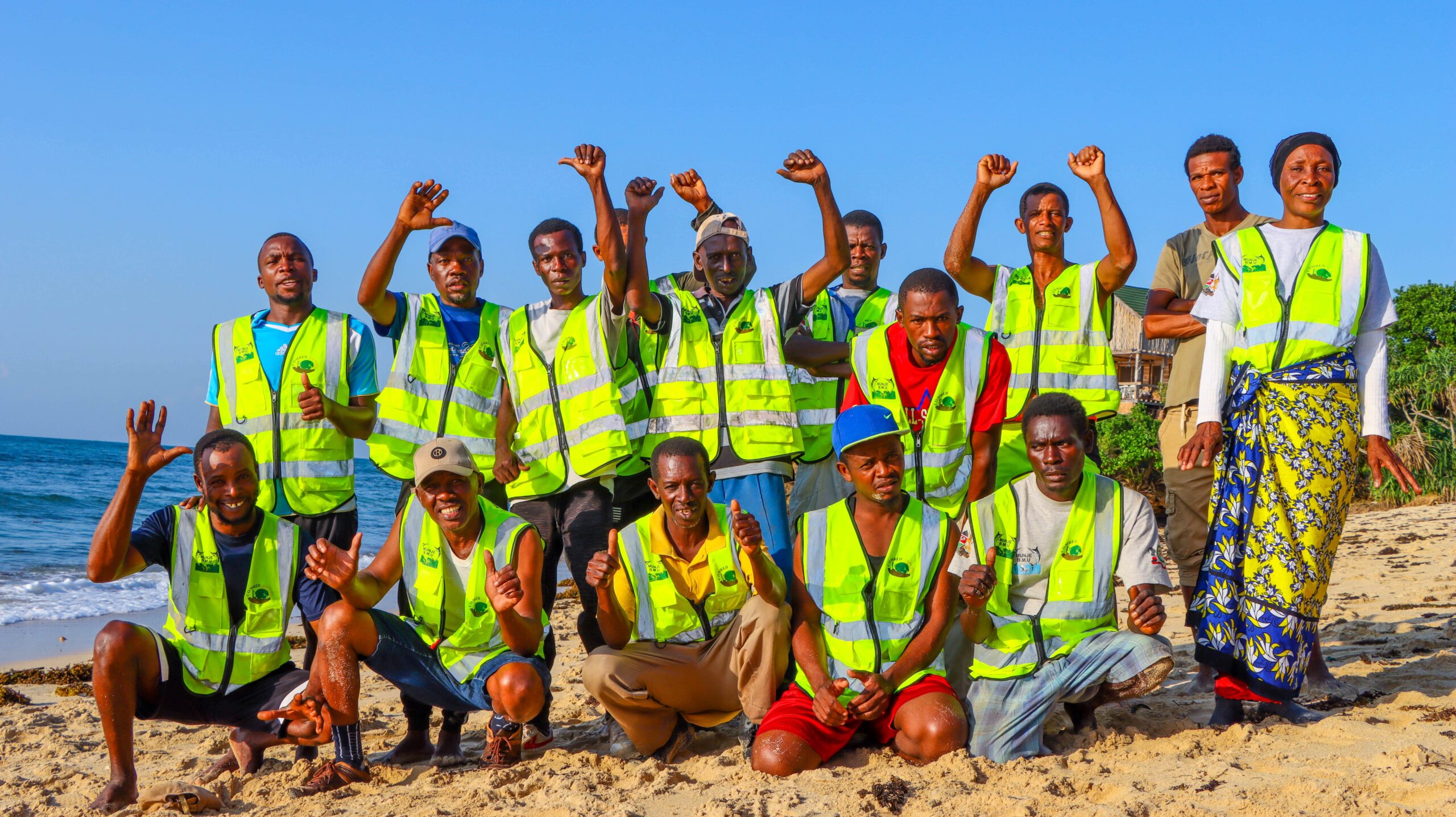Suna Dago on duty at the Munje Octopus Closure. Photo by Ruth Keah
For the past two and a half years, Suna Dago has been navigating a rugged, bushy path toward Munje Beach, where her duties as a security guard at the Munje Octopus Closure await her.
Despite the numerous challenges she faces while patrolling the ocean’s edge, Ms. Dago remains resolute. Clad in a black “buibui”, a luminous green reflective jacket, and a blue “hijab”, she recounts to me her journey of overcoming the entrenched taboo that once barred women from accessing the ocean for fishing activities along the Kenyan coast.
As the sole woman in the patrol department, amidst 14 men in the Munje Beach Management Unit (BMU), conversing with her feels like delving into a tale of hope—a narrative of striving to restore the marine ecosystem ravaged by human activities and the impacts of climate change. These adversities have led to diminished fish catches.
“I chose to oversee the octopus closure because of my proximity to the ocean and my desire to safeguard its environment from potential harm by criminals. By undertaking this responsibility, I envision a future where my children or grandchildren can reap the benefits of the ocean’s resources”, she said.
“Moreover, I aim to serve as a role model, ensuring that even after I’m gone, those who follow in my footsteps will continue to protect and preserve our precious ocean. This endeavor will not only attract tourists to witness and appreciate the marine ecosystem but also contribute to its conservation”, added the 45-year-old mother of seven.

Munje BMU fishermen at the Octopus closure praying before opening it for fishing. Photo by Catherine Muyonga (COMRED)
Octopus fishery closures prohibit fishing activities in a designated area for a specific period, providing protection and conservation measures for marine life and habitats leading to increased yields and more catch for fishers. Recent research shows that tropical small-scale octopus fisheries closures benefit communities by contributing to food security and providing a means to earn their livelihood.
In addition to food security and sustaining communities’ livelihoods, reef closures help improve marine ecosystem management effectiveness.
Since September 2021, Munje community members have been implementing the octopus closure project. The process of establishing the closure was faced with a couple of challenges including community resistance to the initiative due to misinformation, poor BMU governance, and government frameworks that slowed the process.
Nevertheless, the community came to a consensus to set up the closure on 19th June 2023. A patrol team of 15 community members was formed to be manning the closure day and night to prevent any form of illegalities.
Ms. Dago, along with another woman, volunteered to join the patrol team.
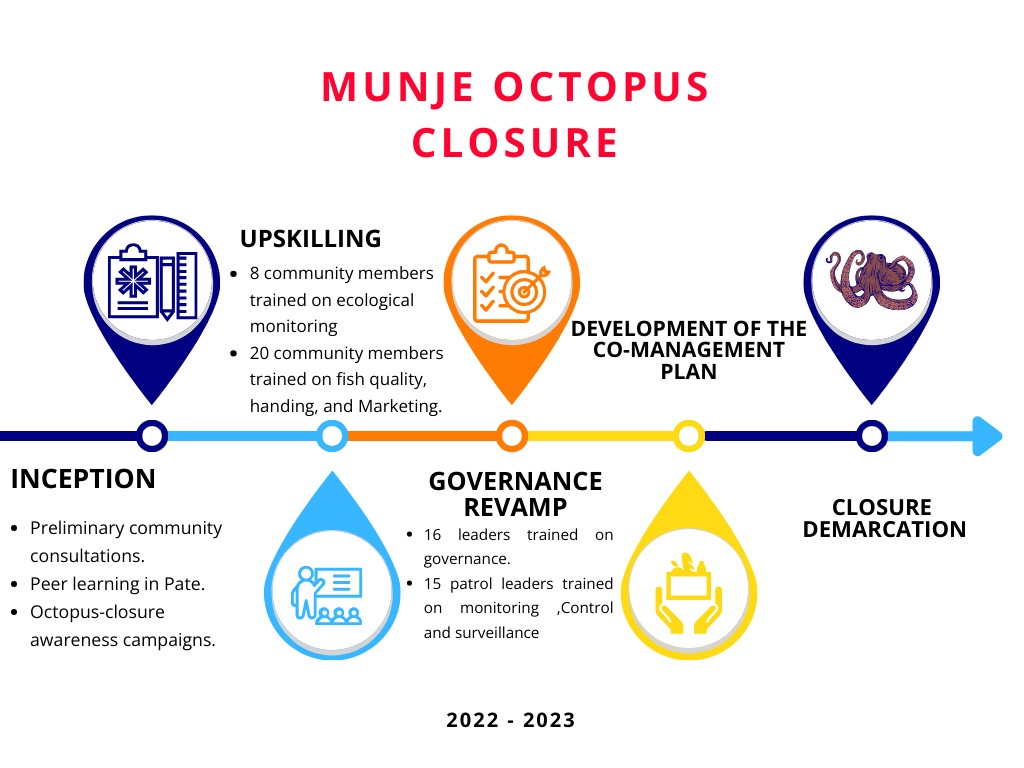
Image by COMRED.
“I initially joined as a BMU member alongside other women engaged in mangrove restoration. However, I eventually chose to join the fishermen in implementing the closure. Initially, two of us volunteered for the task, but when time came for training, my colleague didn’t show up. Another woman was approached and agreed to attend the training with me’’, she said.
“After the training, we returned and began our work. Unfortunately, my colleague only participated for two days before backing off when she realized the challenges involved. Despite being left alone, I persevered, and today marks the second opening of the closure for fishing”, she added.
Ms. Dago said on days when it’s her turn for patrol, she ensures she prepares everything in the evening to ensure she doesn’t run late the following morning.
“When I know it’s my duty the next day, I prepare tea in the evening and place it in a thermos. I also prepare some snacks, fetch water for household use, and pack my attire for patrol. When I wake up in the morning, I pray, the tea is ready. My husband, who is a fisherman, and I enjoy it together before we embark on our journey to the beach. Later, my children can have their tea and head to ‘madrasa”, she said.
Her duty typically begins at 6:00 am, when the water level is at its lowest, providing ample space for those breaching the enclosure to have an easier time, and concludes as the tide returns, filling the ocean once more.
“It’s advisable for us to report early enough so that when the water starts receding, we’re present. This deters fishermen from accessing the closed area, knowing a patrol guard is nearby. They’ll refrain from encroaching and seek other fishing spots instead”, she explained.

Suna Dago and Pawa Tabu posing for a photo while on duty at the Munje Octopus Closure. Photo by Ruth Keah
Overcoming Challenges
For many years, accessing the ocean and participating in ocean activities, such as fishing, was practically taboo for women, as it was considered a man’s job. However, an increasing number of women are now challenging this tradition and turning to aquaculture and ocean conservation activities.
For Ms. Dago, the situation was no different, but through meaningful conversations with her husband, she managed to break the taboos. Eventually, she was allowed to engage in activities such as mangrove restoration and patrolling the octopus closure zones.
“Those old restrictions have faded with time. Nowadays, anyone can go anywhere, as we live in a world that’s constantly changing. I had a candid conversation with my husband, and he gave me permission to go on patrol. After all, these are our resources, and it’s our responsibility to take care of them. As you can see, I’ve just returned from the ocean,” she said, smiling.
Ms. Dago said one of the major challenges she faces in her role is the lack of equipment to apprehend fishermen who trespass into their closure. She explained that often these fishermen have modern, fast boats, making it difficult for them to pursue and apprehend the perpetrators with their older, slower vessels.
“Most of the time, while we’re on the shore monitoring, we observe fishermen with modern boats encroaching upon our territory. We only have older boats, so by the time we decide to pursue them, they’ve already sped away. Additionally, there are many fishermen who employ illegal fishing gear, such as spear guns,” she explained.

A fisherman displaying an octopus Photo by Catherine Muyonga (COMRED)
When we encounter fishermen encroaching our closure, our usual protocol involves promptly notifying our leader via phone call upon spotting any fishermen encroaching on our territory. They are quick to respond. Once they apprehend the intruder, they typically proceed with interrogation and sometimes report them to the Coast Guards.
“Since I began this work, I’ve personally apprehended one criminal. Thankfully, my male colleagues also witnessed his actions. When we raised the alarm, he attempted to flee through the waters to the nearby forest. However, he was apprehended”, she said
Empowering Women, Enriching Oceans
Alphonse Abbas, the head of the patrol unit in the Munje BMU, highlighted Ms. Dago’s pivotal role within their team, particularly during daytime patrols. As a volunteer, he emphasized that she has served as a guiding light for the next generation, demonstrating the importance of preserving their resources, particularly the ocean, upon which their livelihoods depend.
Suleiman Kipapuro, the Vice Chairman of Munje BMU, said the BMU has 220 members. He echoed Abbas sentiments while stating that the closure which is well secured by the guards has already begun to benefit the community. Fishermen are experiencing spill-over from the closure, resulting in increased fish catch. Additionally, it is sparking eco-tourism opportunities in Munje.
The good news to the community in Munje is that the closure site has started attracting tourists for snorkeling and students for research. On February, 2024, Munje hosted 45 students and lecturers from Belgium and Technical University of Mombasa to learn how the community is managing the area with the BMU earning over Ksh 100,000 from the visit.
Kipapuro said once the closure is lifted, revenue is generated from fishing, some is divided among the fishermen, with a portion allocated to the administration of the BMU and the remainder directed towards community welfare initiatives.
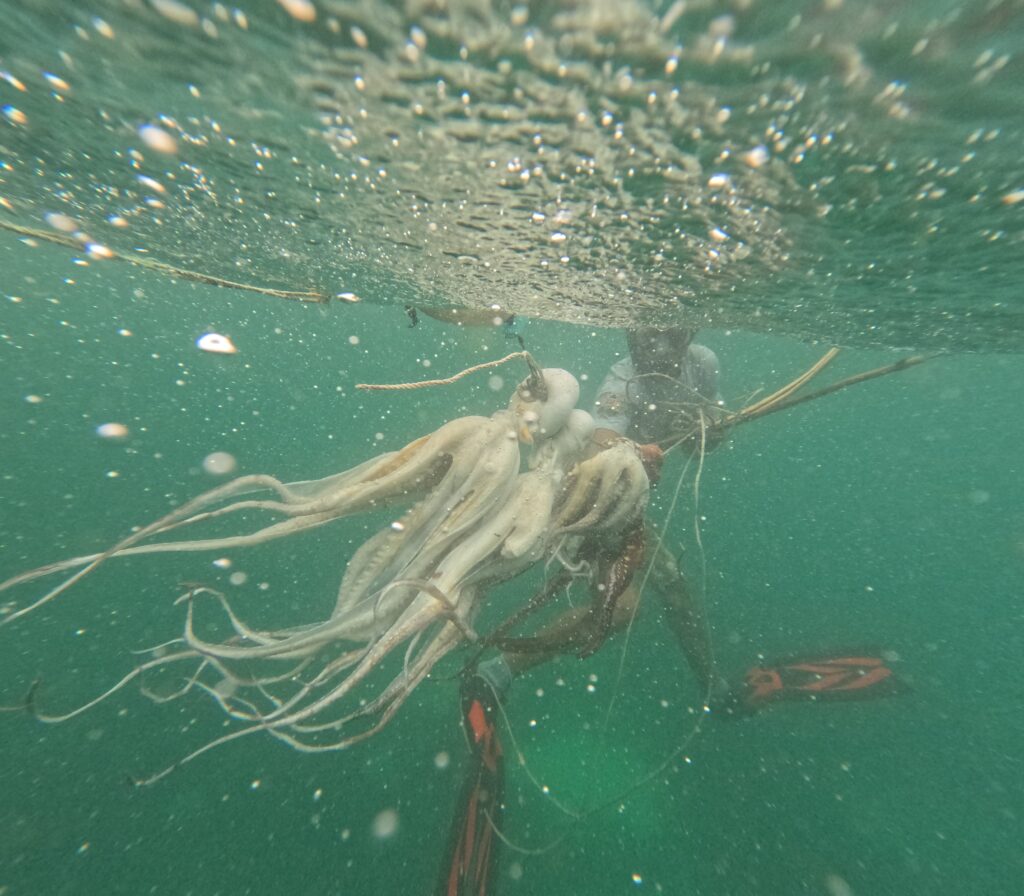
A fisherman with his catch of octopus during the second opening of the closure. Photo by Catherine Muyonga (COMRED)
With the assistance of the patrol team, with Ms. Dago included, the octopus closure was effectively managed. It has been opened twice, resulting in a total harvest of 917.439 kilograms of octopus. The octopus was sold to fish dealers by the BMU, generating a total revenue of Ksh 244,649.
While the patrol guards do not receive a monthly salary, Kipapuro said they are occasionally given a small token of appreciation from the BMU management.
Dr. Joseph Tunje, an environmental scientist and a Co-Director of COMRED, a non-profit organization with the mission to nurture practical solutions to problems facing coastal and marine environments and communities for sustainable development said communities have opted to establish closures to maximize returns from octopus fishing, a high-value fishery.
He stressed the importance of involving women in all ocean activities, as they undertake most of the work—from retrieving the fish from the water to value addition and serving it on the table.
“Incorporating women into marine activities and conservation efforts is vital because their participation enhances the dissemination of knowledge. Educating a woman extends to educating the entire community, as women possess a unique ability to convey the significance of marine conservation and closures to both children and the broader community”, concluded Dr. Tunje.

Fishermen from Munje BMU and COMRED staff measuring the weight of an octopus. Photo by Catherine Muyonga (COMRED)

